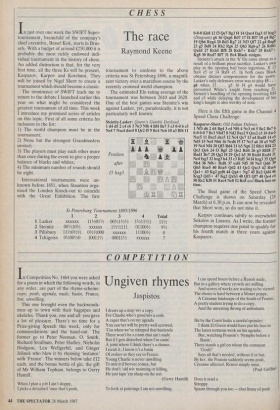CHESS
The race
Raymond Keene
In just over one week the SWIFT Super- tournament, brainchild of the company's chief executive, Bessel Kok, starts in Brus- sels. With a budget of around £250,000 it is probably the most richly endowed indi- vidual tournament in the history of chess. An added distinction is that, for the very first time, all the three Ks will be present, Kasparov, Karpov and Korchnoi. They will be joined by Nigel Short to create a tournament which should become a classic.
The imminence of SWIFT leads me to return to the debate I launched earlier this year on what might be considered the greatest tournament of all time. This week I introduce my promised series of articles on this topic. First of all some criteria for inclusion in the list: 1) The world champion must be in the tournament; 2) None but the strongest Grandmasters invited; 3) The players must play each other more than once during the event to give a proper balance of blacks and whites; 4) The minimum number of rounds should be eight.
International tournaments were un- known before 1851, when Staunton orga- nised the London Knock-out to coincide with the Great Exhibition. The first tournament to conform to the above criteria was St Petersburg 1896, a magnifi- cent victory over a marathon course by the recently crowned world champion.
The estimated Elo rating average of the tournament was between 2610 and 2620. One of the best games was Steinitz's win against Laker, yet, paradoxically, it is not particularly well known:
Steinitz-Lasker: Queen's Gambit Declined.
1 d4 d5 2 c4 e6 3 Nc3 Nf6 4 Bf4 Be7 5 e3 0-0 6 c5 Ne4 7 Nxe4 dxe4 8 Qc2 f5 9 Bc4 Nc6 10 a3 Bf6 11
Position after 15 hxg3
3 4 Total 001/211/21/2 11/2111/21 111/2 11/21/2111 011001/2 91/2 xxxxxx 111001/2 8 00011½ xxxxxx 7
1 2
1 Lasker xxxxxx 111/2011/2 2 Steinitz 001/2101/2 xxxxxx 3 Pillsbury 111/201/21/2 01/21/2000 4 Tchigorin 01/2001/20 100111/2 St Petersburg Tournament 189511896 0-0-0 Kh8 12 13 Qe7 Bg3 f4 14 Qxe4 fxg3 15 hxg3 (Diagram) g6 16 Qxg6 Bd7 17 f4 R1f7 18 g4 19 Qh6 Rxg4 20 Bd3 Rg7 21 Nf3 Qf7 22 g4 Rag8 23 g5 Bd8 24 Rh2 Rg6 25 Qh5 Rg6-g7 26 Rdhl Qxh5 27 Rxh5 Rf8 28 Rxh7+ Rxh7 29 Rxh7+ Kg8 30 Rxd7 R17 31 Bc4 Black resigns. Steinitz's attack in the 'h' file came about as a result of a brilliant piece sacrifice. Lasker's own play in the opening had been ingenious. If 13 fice4 e5 or 14 Bxf4 e5. In both cases Black obtains distinct compensation for the pawn. Lasker's only defensive error was to play 15. . • g6 when 15 . . . g5 16 f4 g4 would have prevented White's knight from reaching f3. Steinitz's handling of the opening involving Bf4 and c5 while delaying the development of his king's knight is also worthy of note.
Here is the fifth game in the Channel 4 Speed Chess Challenge:
Kasparov-Short: Old Indian Defence.
1 Nf3 d6 2 d4 Bg4 3 e4 Nf6 4 Nc3 e6 5 Be2 Bel 6 0-0 0-07 Be3 Nbd7 8 Nd2 Bxe2 9 Qxe2 c5 10 dxc5 Nxc5 11 Bxc5 dxc5 12 Nc4 Qc7 13 a4 Rad8 14 e5 Nd5 15 Ne4 Nb6 16 Ncd6 f5 17 Nc3 a6 18 a5 Nd5 19 Nc4 Nf4 20 Q13 Rd4 21 b3 Ng6 22 Rfel Rf4 23 Qe3 Qc6 24 13 Bg5 25 Qe2 Rd4 26 g3 Rfd8 21 Radl Be7 28 Qg2 f4 29 Qe2 h5 30 Rxd4 Rxd4 31 Ne4 fxg3 32 hxg3 h4 33 c3 Rd5 34 f4 hxg3 35 Qg4 Nh4 36 Nf6+ Bxf6 37 exf6 Nf5 38 Ne5 Qd6 39 Qh5 Rxe5 40 Rxe5 Qd2 41 Qe2 Qxc3 42 Rxe6 Qal+ 43 Kg2 gxf6 44 Qg4+ Ng7 45 Re2 Qd4 46
Kxg3 Qd3+ 47 Kg2 Qxb3 48 Qf3 48 Qe4 c4 50 Rc2 1(1851 Rxc4 Ne8 52 Rc8 and Black lost On time.
The final game of the Speed Chess Challenge is shown on Saturday (28 March) at 6.30 p.m. It can now be revealed that Short won, so do not miss it.
Karpov continues subtly to overwhelm Sokolov in Linares. As I write, the former champion requires one point to qualify for his fourth match in three years against Kasparov.


















































 Previous page
Previous page